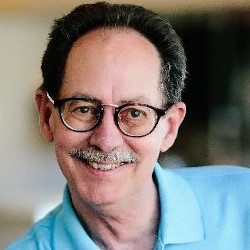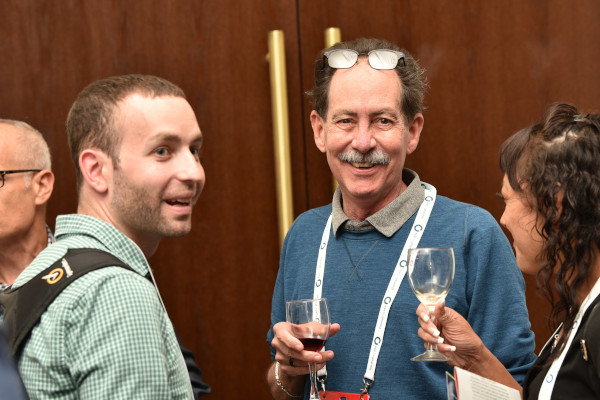
John Linnell, COPD Foundation, US COPD Coalition
John was diagnosed with COPD in 2005 at the age of 50. Now, he has been serving numerous patient advocacy positions, at both national and international levels.
John is a member of the Board of Directors for the US COPD Coalition, the Executive Board of Directors for EFFORTS, and the Governing Board for the COPD Foundation PPRN (Patient Powered Research Network). John also sat as a patient reviewer for the United States Department of Defense Peer Reviewed Medical Research Program for several years. John is also finishing a study funded by the Patient-Centered Outcomes Research Institute at Johns Hopkins University School of Medicine, entitled, “Impact of a Peer Support Program Amongst COPD Patients and Their Caregivers.” The outcomes and results are currently being prepared for publication in a peer reviewed medical journal which will list him as a co-author.
Emi: John, you have been involved with patient-involvement activities locally and globally, making remarkable achievements and co-authoring a paper on patient-centered outcomes. Could you tell us about your journey – why and how did you get so deeply involved in advocacy for patient-centricity?
John: I was first diagnosed in 2005. As my COPD progressed, I eventually was no longer effective at my job. I had to leave work and apply for disability income. This entire process was obviously something I had not gone through before and I knew nothing about.
How would I apply for disability income? How long would I have to wait? How would I pay my bills with no income? Where would my medical care now come from? How would I afford my expensive inhaled medications?
All of these questions and even more swirled through my head! There is no book or manual to explain this, so I had to turn to the computer and begin researching what I would need to do.
On my own, I had to figure out that pharma companies have patient assistance programs. On my own, I had to discover clinical trials which provided my medical care, while at the same time, my participation in the trials would help others.
During this process, I also discovered a peer support group through the American Lung Association called “Better Breathers.” Once a month, several patients with COPD would get together and listen to a guest speaker on various aspects of living with COPD. It was very important to me as well as all COPD patients to socialize with others that also have COPD. There is a bond, of sorts, that exists when you are with others that have the same condition.
Through this group, I was invited to be a part of a national campaign to be a “COPD Ambassador” and represent the voice of the patient and share my journey in front of a very large group of pharma salespeople.
Since I was no longer in the workforce, yet did not want to just sit around, I discovered that this was incredibly rewarding to me. One opportunity led to another. I began helping to moderate some COPD groups on Facebook. I became involved with the COPD Foundation which led to being asked by a research doctor at Johns Hopkins to be the patient co-investigator on a project that would examine outcomes when COPD patients interact with peer mentors which we called “Breathe Buddies.”
Through all of this, I was occasionally asked to speak or be on various panels. This led to me being asked to join a Board of Directors. Fortunately, public speaking is not something I fear; I enjoy helping educate others and providing the patient perspective.
I happen to also enjoy traveling a great deal. These opportunities have allowed me to travel to different cities when I need to attend conferences or meetings. So, overall, being an “involved patient”—both helping other patients and representing the voice of the patient on Boards, panels, and projects—helps me as well. I feel blessed and rewarded that I am able to play a part in working towards the mission of broader education, earlier diagnosis, better research funding, and letting industry know: “If it is without us, it is not about us.”

Emi: Sometimes, advocacy actions are limited to certain types of patient leaders. How do you encourage and empower your fellow COPD peers to become involved?
John: Often, others with COPD will tell me, “I sure wish I could do things to be as involved as you are, but I am not good at speaking in front of a group,” or “I can’t travel very far anymore.” Well, my response is that they can still be involved in advocacy and help other COPD patients, while helping the respiratory community as a whole.
Some of my suggestions include:
- Help staff at a table handing out educational literature at a health fair
- Call and write your elected officials to ask for them to support a certain bill that is up for a vote
- Assist answering phones on a hotline designated for patients who need to talk to someone
- Be an administrator of a Facebook or other social media group to help keep the group focused on the issues at hand
- Participate in a clinical trial that will further research on COPD
- Offer to be on a Patient Advisory Panel that connects by phone with a pharma company or other related company that is seeking the patient perspective.
I believe that every one of us has value and each of us can contribute in our own way. I happen to be very outgoing and do not mind being in front of large crowds. Some are fearful of being too far from home; others feel they do not have the education or the skills to be publicly involved. The examples I listed above are just a few of the many ways everyone can be involved and become an active integral part of the COPD community. We truly are a community, no matter how far apart in distance, joined together by the fact that we all have COPD.
Emi: What was a key lesson learned, or your best moment through working with pharmaceutical companies?
John: Sometimes, people will ask how and why I work with pharma. I am more than aware that there is sometimes a lack of trust (at least in the United States) from patients towards pharma companies. I think that ultimately both pharmaceutical companies and patients want the same thing; so, I believe that working with and alongside pharma can help strengthen the relationship, while at the same time letting pharma know what we both want and need.
My first experience working with pharma was when I spoke at a pharma meeting 6 years ago. At that time, I was simply telling my COPD story. As my involvement grew, I realized that patients and pharma working and collaborating together can help with everything, including:
- Improving communication
- Supporting research
- Reviewing package design
- Reviewing their summaries
- Assessing package inserts and instructions so that people without scientific backgrounds, such as us, can understand
Pharma wants to be “patient-centric.” I attend a few conferences every year that are specifically focused on “Patient Centricity” and these are conferences attended by those in management positions across the pharma industry. This demonstrates to me that there truly is a desire to listen and actually hear the patient. All of this is very encouraging to me and simply makes me want to do more and become even more involved than I already am.
We need to all work together and keep the momentum flowing. Someone at a recent conference said, “Momentum is fleeting.” That simply means that it is easy to become excited about something and shortly after the momentum wanes, it is no longer so important. Well, I consider a key role in my job is to keep the momentum flowing and continue to use my voice with pharma to keep urging them onward to do good things for all of us!
Emi: Please give us some comments for the COPD patient community in Japan.
John: Being asked to comment on the COPD Patient Community in Japan is both my favorite question which I have been asked to comment on, while at the same time the one I know the least about!!
From what I have been told, the culture in Japan is to not be confrontational. I would think that we can still put forth our viewpoints on how we, as patients, would like pharma, industry, health care professionals, and government to change or at least consider our needs. It is possible to speak of change without insulting what is currently happening. Change happens with communication and understanding; and who better to understand the COPD patient and their needs than the patients themselves? Pharma truly wants to know what they can do better to help us all. We owe it to ourselves to tell them and work with them. It is our COPD. We live with it, so when given the chance and opportunity, we should accept the invitation and meet them at the table.
I admittedly know little personally about the Japanese patient and their viewpoints. I do, however, believe that both the American patient and the Japanese patient could learn a great deal from each other. A collaboration and sharing of ideas from both East and West would only bring a positive and better understanding to the entire world population of those with COPD.
I would challenge pharma to act on this idea and bring a panel together. A trip to Japan would be something I would gladly be willing to participate in, along with my wife who helps on the travels. I enjoy learning from other perspectives and certainly enjoy sharing my ideas with others.





